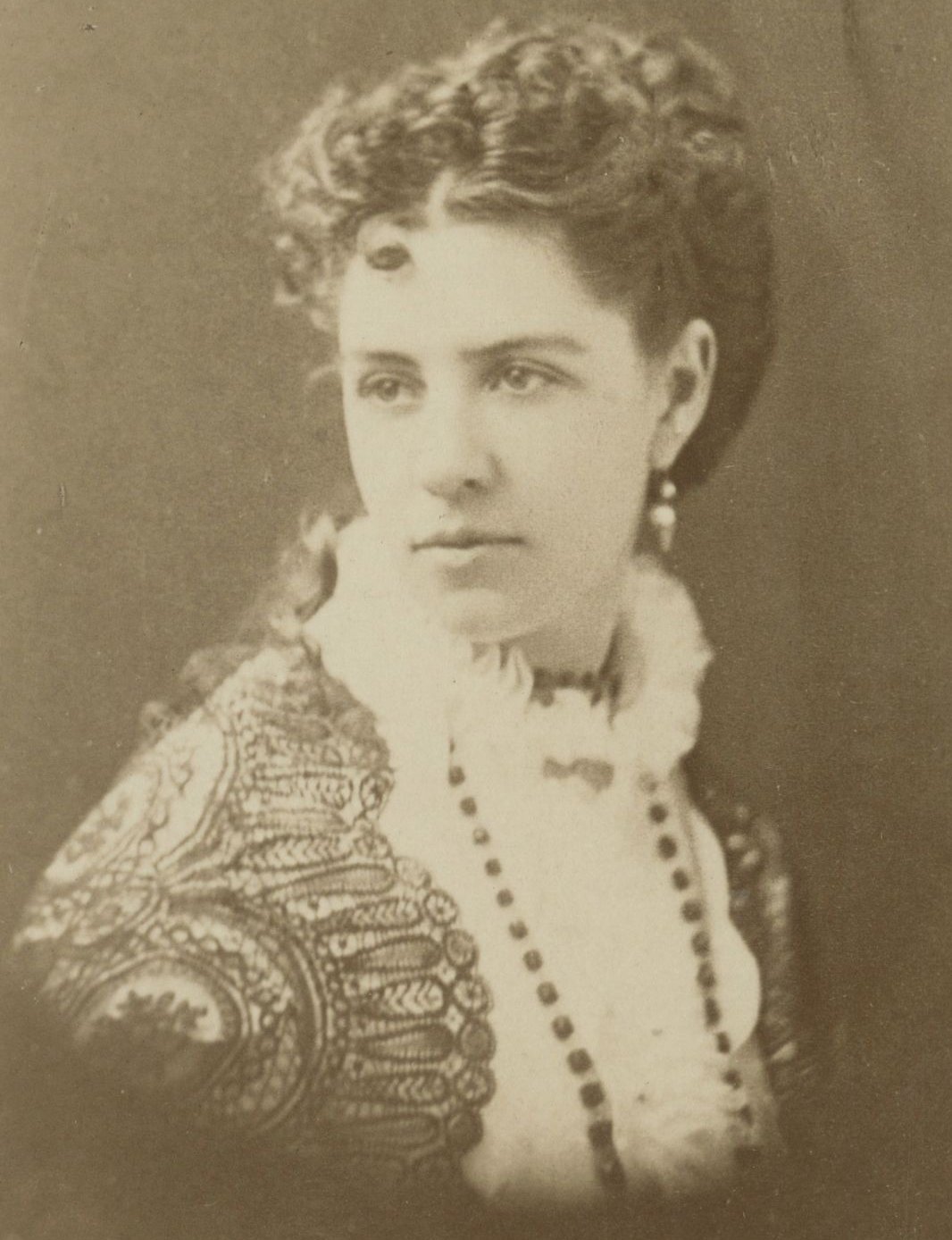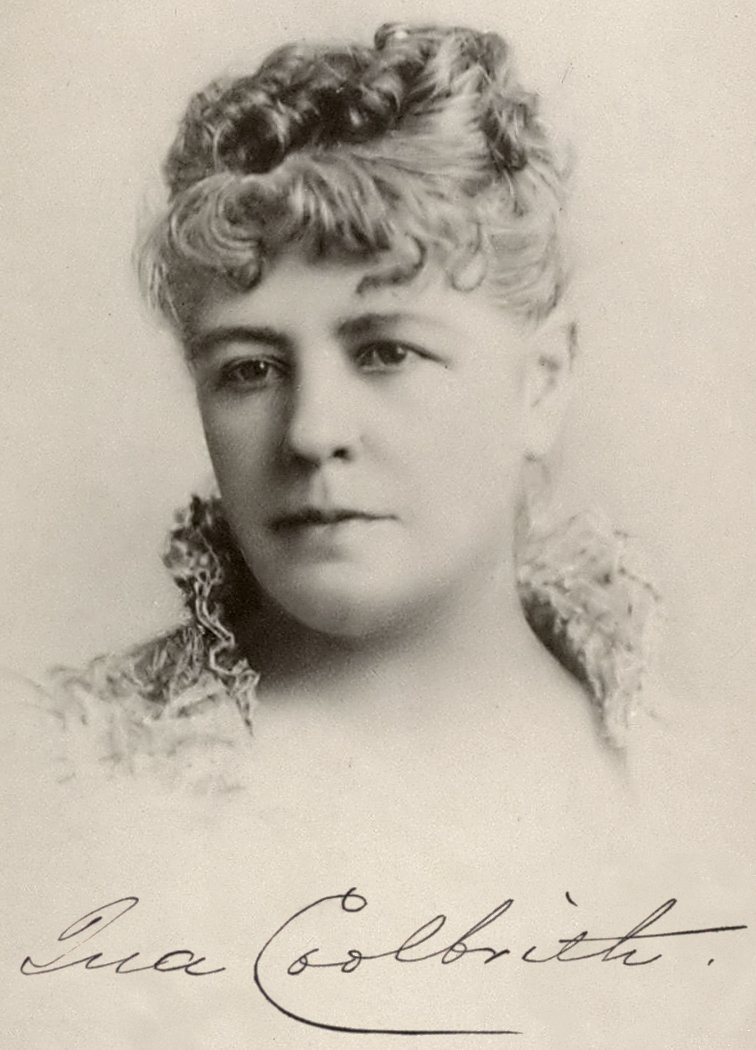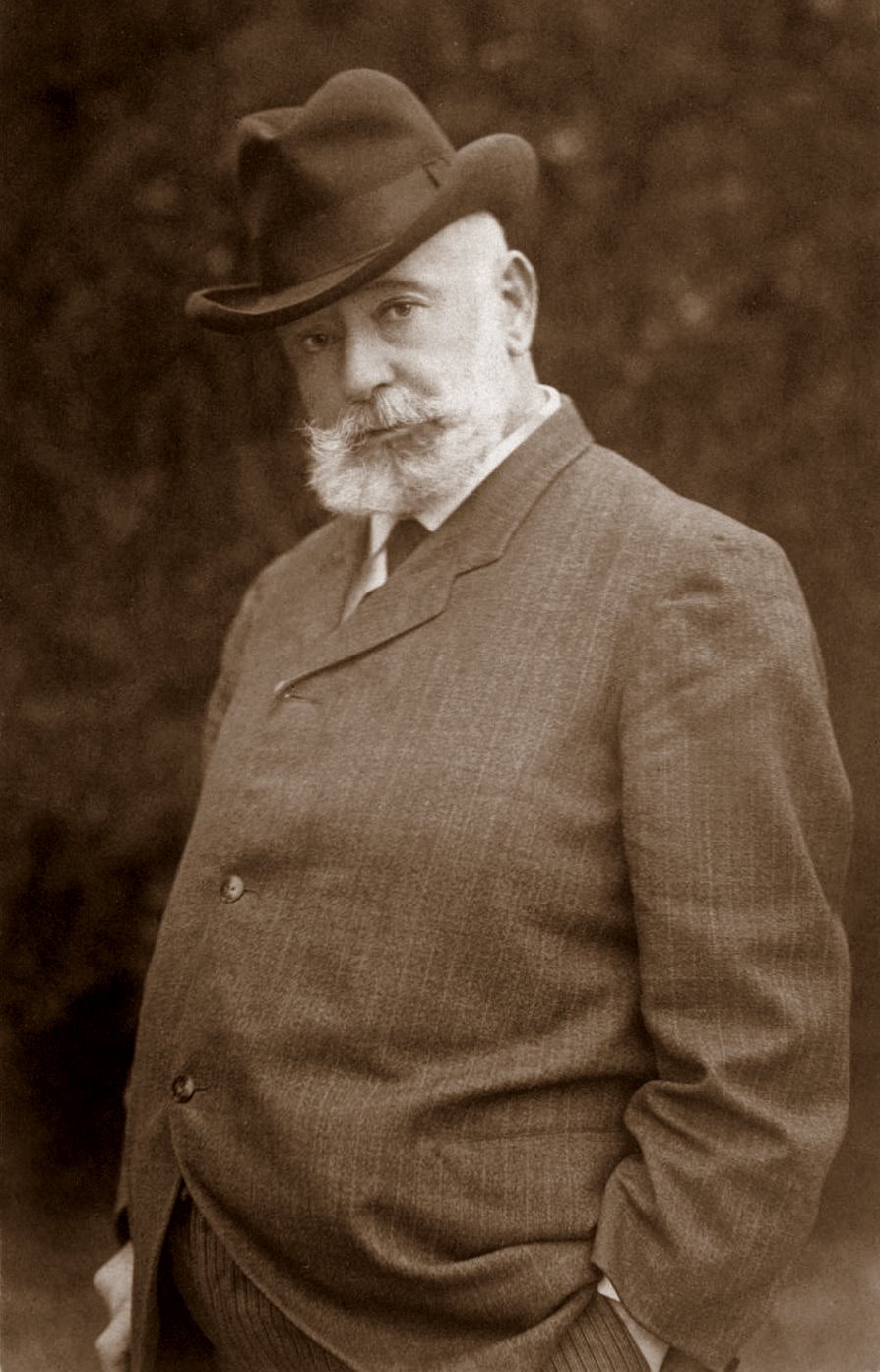Ina Coolbrith, California's first Poet Laureate

Ina Coolbrith
Ina Coolbrith was the niece of Joseph Smith, founder of the Church of Jesus Christ of Latter-day Saints, and his step-daughter in his only levirate marriage. Her mother left the church after Smith's murder and re-married. Because of the extreme anti-Mormon sentiment at the time Coolbrith did not publicly acknowledge the relationship, although she remained in touch with her Smith cousins.
In 1849 Ina moved to Los Angeles with her family. She was the first white child to cross Beckwourth Pass in the Sierra Mountains. Mount Ina Coolbrith near the pass is named after her.
With them the Coolbriths carried a book of Byron's poems that sparked Ina's life-long "Byronic fever".
A number of significant events happened to Ina Coolbrith in LA - first publication (in LA Star) at 15, marriage at 17, sensational divorce at 20, and death of her infant son. She wrote a beautiful poem, The Mother's Grief (https://allpoetry.com/The-Mothers-Grief ), but never spoke about him.
As a way of coping with her deep depression Ms Coolbrith moved to San Francisco in 1862. In 1868 she began work as a journalist on the new Overland Monthly, first nationally recognized literary magazine in the Western USA. It was edited by Bret Harte and Charles Warren Stoddard. For their poetic talents they became known as the Golden Gate Trinity.
She held literary salons where one could meet Mark Twain, Ambrose Bierce, Ada Clare, Adah Isaacs Menken (famous for her seemingly-naked appearance in "Mazeppa"), Gelett Burgess, Laura Redden Searing and, of course, Coolbrith's protégé and lover Joaquin Miller. His adoption of the name "Joaquin" instead of his own "Cincinnatus Hiner " was Coolbrith's suggestion, as was his adoption of a wilder, more romantic public image, with mountain-man dress and long locks.
Miller went on to fulfill his and Coolbrith's joint dream of laying a laurel wreath on Byron's grave, while Coolbrith took care of her family and his daughter in San Francisco. Together they gathered laurel branches in the "beautiful wildwood" of Sausalito for the wreath, and sent to Constantine I of Greece for a second one, to hang together. Thoughtfully, Constantine also sent a glass dome to protect both wreaths, and some money for the upkeep of the dilapidated church.
In 1874 Ms. Coolbrith, now a mother of three foster children (her sister's orphans and Joaquin Miller's daughter), became the first librarian in the first free library in Oakland. She worked twelve-hour days six days a week for a mere $80 per month, much less than a man would have received. This took a great toll on both her health and her poetry.
Coolbrith believed that a librarian's job was to carefully choose books for each customer, and made a great impression on young Jack London and Isidora Duncan, as well as many other children, with the books she chose for them. She resisted classifying the books and ran the library as more of a reading room. This was inefficient, and many adults preferred to choose books on their own.
After nineteen years as librarian, Coolbrith was replaced with a mere three days' notice by her own nephew and assistant, who optimized the lending process and quickly grew the membership threefold. She forgave him.
John Muir suggested that she take the vacant place of San Francisco's librarian, but they wanted a man. Her friends at the Bohemian Club made a librarian's position for her, which, although not as well-paid, allowed time for Coolbrith to work on her poetry.
Coolbrith's poems were much praised by such critics as Mark Twain, Ambrose Bierce, and Alfred Lord Tennyson. Her home was a treasury of her friends' letters and signed books, but all these and the memoir that took Coolbrith ten years to write perished in the 1906 fire. Deathly ill, she stumbled out of her house in nightclothes, carrying only one of her white Persian cats. Fortunately, the second cat was saved by Collbrith's caretaker.
The house, her library of three thousand books, her art, and all else in it was lost.
Members of the Bohemian Club, San Jose Women's Club, multiple writers, and her friend, author Gertrude Atherton came together to build Coolbrith a new house, but the manuscript proved irreplaceable. Mark Twain contributed 20 photographs of himself to be sold for the building fund.
By 1910 Gertrude Atherton realized that Coolbrith can either be prolific or self-supporting, and endowed her with a trust. The Bohemian Club contributed a grant, and Coolbrith wrote more in the next four years than in the prior twenty five.
Those were also years of public acknowledgement. Coolbrith became president of the Pacific Coast Woman's Press Association, had a park named after her, was named honorary member of the California Writers Club and President of the Congress of Authors and Journalists for the Panama-Pacific International Exhibition, and finally, in 1915, became California's first Poet Laureate. While receiving her laurel wreath from the President of University of California Coolbrith announced that she wished to share the honor with Josephine Clifford McCracken, the last surviving member of Bret Harte's Overland Monthly writing staff.
None of these honors, however, brought in much money, and neither did her collection of Stoddard's poetry that took years to edit. By 1923 Coolbrith lived penniless and alone in New York. The performer Lotta Crabtree gathered money to bring Coolbrith back to Berkeley, where she died in 1928. She was buried in Oakland, in a grave that remained unmarked for the next 58 years. Ina Coolbrith Circle, began in 1919 as a way for her friends and admirers to come together, still meets in her memory: http://www.coolpoetry.org/
To San Francisco
Fair on your hills, my City,
Fair as the Queen of old,
Supreme in her seven-hilled splendor-
You, from your Gate of Gold,
Facing the orient sunburst,
Swathed in the sunset gleams,
Throned in an ultimate glory,
City of mists and of dreams!
In 1849 Ina moved to Los Angeles with her family. She was the first white child to cross Beckwourth Pass in the Sierra Mountains. Mount Ina Coolbrith near the pass is named after her.
With them the Coolbriths carried a book of Byron's poems that sparked Ina's life-long "Byronic fever".
A number of significant events happened to Ina Coolbrith in LA - first publication (in LA Star) at 15, marriage at 17, sensational divorce at 20, and death of her infant son. She wrote a beautiful poem, The Mother's Grief (https://allpoetry.com/The-Mothers-Grief ), but never spoke about him.
As a way of coping with her deep depression Ms Coolbrith moved to San Francisco in 1862. In 1868 she began work as a journalist on the new Overland Monthly, first nationally recognized literary magazine in the Western USA. It was edited by Bret Harte and Charles Warren Stoddard. For their poetic talents they became known as the Golden Gate Trinity.
She held literary salons where one could meet Mark Twain, Ambrose Bierce, Ada Clare, Adah Isaacs Menken (famous for her seemingly-naked appearance in "Mazeppa"), Gelett Burgess, Laura Redden Searing and, of course, Coolbrith's protégé and lover Joaquin Miller. His adoption of the name "Joaquin" instead of his own "Cincinnatus Hiner " was Coolbrith's suggestion, as was his adoption of a wilder, more romantic public image, with mountain-man dress and long locks.
Miller went on to fulfill his and Coolbrith's joint dream of laying a laurel wreath on Byron's grave, while Coolbrith took care of her family and his daughter in San Francisco. Together they gathered laurel branches in the "beautiful wildwood" of Sausalito for the wreath, and sent to Constantine I of Greece for a second one, to hang together. Thoughtfully, Constantine also sent a glass dome to protect both wreaths, and some money for the upkeep of the dilapidated church.
In 1874 Ms. Coolbrith, now a mother of three foster children (her sister's orphans and Joaquin Miller's daughter), became the first librarian in the first free library in Oakland. She worked twelve-hour days six days a week for a mere $80 per month, much less than a man would have received. This took a great toll on both her health and her poetry.
Coolbrith believed that a librarian's job was to carefully choose books for each customer, and made a great impression on young Jack London and Isidora Duncan, as well as many other children, with the books she chose for them. She resisted classifying the books and ran the library as more of a reading room. This was inefficient, and many adults preferred to choose books on their own.
After nineteen years as librarian, Coolbrith was replaced with a mere three days' notice by her own nephew and assistant, who optimized the lending process and quickly grew the membership threefold. She forgave him.
John Muir suggested that she take the vacant place of San Francisco's librarian, but they wanted a man. Her friends at the Bohemian Club made a librarian's position for her, which, although not as well-paid, allowed time for Coolbrith to work on her poetry.
Coolbrith's poems were much praised by such critics as Mark Twain, Ambrose Bierce, and Alfred Lord Tennyson. Her home was a treasury of her friends' letters and signed books, but all these and the memoir that took Coolbrith ten years to write perished in the 1906 fire. Deathly ill, she stumbled out of her house in nightclothes, carrying only one of her white Persian cats. Fortunately, the second cat was saved by Collbrith's caretaker.
The house, her library of three thousand books, her art, and all else in it was lost.
Members of the Bohemian Club, San Jose Women's Club, multiple writers, and her friend, author Gertrude Atherton came together to build Coolbrith a new house, but the manuscript proved irreplaceable. Mark Twain contributed 20 photographs of himself to be sold for the building fund.
By 1910 Gertrude Atherton realized that Coolbrith can either be prolific or self-supporting, and endowed her with a trust. The Bohemian Club contributed a grant, and Coolbrith wrote more in the next four years than in the prior twenty five.
Those were also years of public acknowledgement. Coolbrith became president of the Pacific Coast Woman's Press Association, had a park named after her, was named honorary member of the California Writers Club and President of the Congress of Authors and Journalists for the Panama-Pacific International Exhibition, and finally, in 1915, became California's first Poet Laureate. While receiving her laurel wreath from the President of University of California Coolbrith announced that she wished to share the honor with Josephine Clifford McCracken, the last surviving member of Bret Harte's Overland Monthly writing staff.
None of these honors, however, brought in much money, and neither did her collection of Stoddard's poetry that took years to edit. By 1923 Coolbrith lived penniless and alone in New York. The performer Lotta Crabtree gathered money to bring Coolbrith back to Berkeley, where she died in 1928. She was buried in Oakland, in a grave that remained unmarked for the next 58 years. Ina Coolbrith Circle, began in 1919 as a way for her friends and admirers to come together, still meets in her memory: http://www.coolpoetry.org/
To San Francisco
Fair on your hills, my City,
Fair as the Queen of old,
Supreme in her seven-hilled splendor-
You, from your Gate of Gold,
Facing the orient sunburst,
Swathed in the sunset gleams,
Throned in an ultimate glory,
City of mists and of dreams!

Ina Coolbrith

Ina Coolbrith

Ina Coolbrith

Ina Coolbrith

